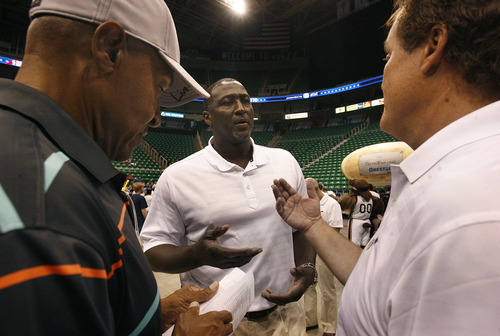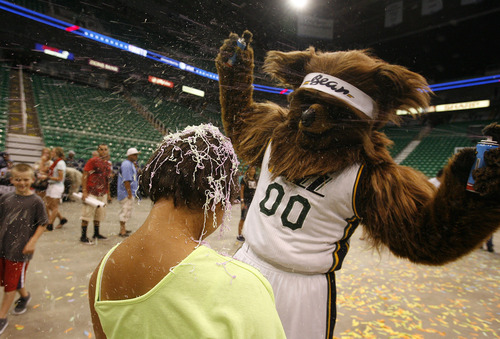This is an archived article that was published on sltrib.com in 2013, and information in the article may be outdated. It is provided only for personal research purposes and may not be reprinted.
With the NBA combine underway this week in Chicago, the Utah Jazz are busy studying their options, working through every possibility, tossing them in the air like a dough slapper at Pizano's. They have two picks in the coming draft, one in the lottery, a likely No. 14 selection, and another at No. 21.
There is both skepticism and sunshine as to whether the Jazz can add to their half-vacant roster a player or two who will actually help them improve what is already a young core. There's been talk that this draft is weak, that it won't benefit the club in any meaningful way, particularly at the positions where Utah is most thin.
Kevin O'Connor, though, believes that last part is a bunch of hooey. He says there are useful players available, even from deep, whether the Jazz stay put or move up.
"There will be a player there that, hopefully we draft, but if not, drafted after us, that becomes a good NBA player," he says. "[It's] our responsibility, our call, our job. … We've got to do it right and if we don't do it right often enough, then we shouldn't have the job."
Those words might sound as though they are selling what the Jazz have said they will sell until the team once again becomes what it used to be — a real contender: hope.
Living off the fumes of Stockton and Malone has pretty much run its course. And since nobody around here wants to focus much on the brief up-blip that was Deron Williams and Carlos Boozer, that leaves the Jazz with not a lot to grab ahold of in recent seasons.
There is the ongoing development of that young core four — which was curbed a bit by Ty Corbin's choice to give the lion's share of the minutes to more veteran players in an ill-fated attempt to make the playoffs this past season, players who probably won't be around next year — and that is where Jazz fans have placed most of that hope.
The back half of O'Connor's statement is a confession of accountability. If what he says is correct, there is an opportunity here, if sound acumen and good judgment are properly applied. Jazz leadership openly taking that kind of responsibility is a plus. They've always had to be smarter than the average executives to make their small-market team better. Sometimes they have been and sometimes they haven't. Now, though, is an important transitional time in Jazz history for them not to whiff.
But the complications, indeed, are double-barreled: one, the overall talent is limited, and two, the players available at the positions of greatest need are even more limited.
The entire planet knows the Jazz are desperate for a point guard, a set-up man who can make the young bigs more effective at the offensive end. Players such as Derrick Favors and Enes Kanter, two former No. 3 overall picks, must do their part during the offseason to continue to groom their games. But they also need the point guard, whoever it is, to help them along by making it a priority to go to their strengths, instead of set his own shot up or simply create his own opportunities.
The Jazz also need proficient offensive production at shooting guard. If Al Jefferson and Paul Millsap are headed out, the Jazz have to find those points elsewhere, especially if Favors and Kanter are getting many more minutes. Favors has a chance to be an elite defender, but, as mentioned, his offense needs work. Kanter has a nice touch and has shown the possibility of terrific offensive growth. But when you're talking about replacing the output of Jefferson, while gaining the defensive upgrade of Favors, if he stays out of foul trouble, a whole lot of additional points are needed — quickly.
A sign-and-trade could happen, but … given only what is known, the Jazz's improvement must be addressed somehow. They could blow part of their impressive financial flexibility on a free agent, but … which one, Jarrett Jack? Would they trade for the oft-injured Eric Gordon?
Of the draft's subjective top 21 prospects, only a relative small number are point guards and shooting guards. There's Ben McLemore, a 6-5 shooter; Trey Burke, the 6-foot point out of Michigan; Victor Oladipo, a 6-5 two-guard; Michael Carter-Williams, a 6-6 point guard; C.J. McCollum, out of Lehigh; Kentavious Caldwell-Pope of Georgia; Archie Goodwin from Kentucky; and San Diego State's Jamaal Franklin.
O'Connor insists that the Jazz will take the best player on their board in the first round, not concentrate on positions.
"You get nauseated when I say, 'best player available,' " he says. " … When we say that, we mean it. Some of the biggest mistakes that have been made were when [teams] drafted by position, by need, rather than ability."
He remembers that the Blazers picked Sam Bowie instead of Michael Jordan.
So, the Jazz will give talent the nod, what there is of it.
From there, skepticism or sunshine will stake its claim.
Gordon Monson hosts "The Big Show" weekdays from 3-7 p.m. on 97.5 FM, 1280 AM, and 960 AM The Zone. Twitter: @GordonMonson.





